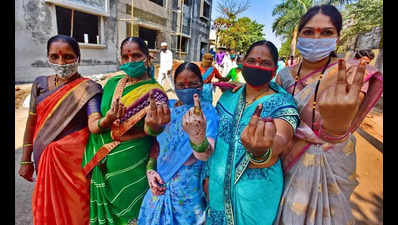
Pune: As many as 97 constituencies, or one-third of the state's 288 assembly seats, have no woman contesting this election. Of the 4,120 candidates in Maharashtra, 359 are women, which is less than 10%, yet again highlighting the abysmal representation of women in politics. The state's two major poll blocs have fielded only 55 women across the state — 29 from the Maha Vikas Aghadi and 26 from Mahayuti.
The rest are mostly independents and from smaller parties such as the MNS and Vanchit Bahujan Aghadi. This low figure is despite the two major alliances' discourse on women empowerment, the launch of schemes such as Ladki Bahin and the Parliament passing a law last year to reserve one-third of Lok Sabha and assembly seats for women — a law that is yet to be implemented. Parvati assembly seat in Pune district is the only constituency with good representation.
With seven women in the fray, it also has the most number of female candidates in any constituency in the state. The two main contenders from Parvati are both women, again the only such contest in the state. MVA has nominated Ashwini Jagtap against Mahayuti's Madhuri Misal, who is looking for a fourth straight win from the seat.
Other prominent seats in the state with more women in the ring are Aurangabad East (6) and Jalgaon City, Nagpur South, Deolali, and Kurla, which have five candidates each. Though the numbers paint a different picture, both the MVA and Mahayuti camps claim they have given tickets to women candidates. However, they also admit that there is scope for improvement.
Senior NCP (SCP) neta Vandana Chavan laid the blame on the delay in implementation of the women's reservation bill. It is expected to be implemented around 2029, after the delimitation exercise following the long-delayed decennial census. "Our leader Sharad Pawar always pushed for more representation for women at all levels, starting from the self-governing bodies to the parliament.
More women should get a chance to contest elections," Chavan said. Chandrakant Bhujbal of the Political Research and Analysis Bureau said the representation of women is fairly low and must go up. "Political parties should encourage women candidates.
It has been observed that parties generally prefer family members as women candidates. But there should be a comprehensive approach while selecting candidates," he said..














